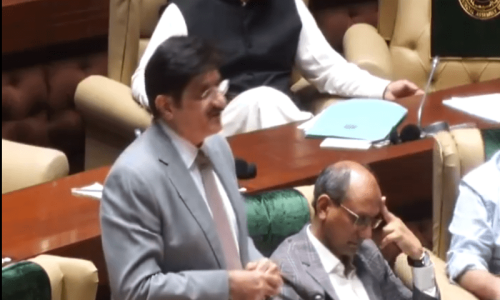KARACHI: Our young men and women have the potential to put the country on the road to development. Give them a chance. Caring for youth no longer means planning their lives in the light of decayed and discarded wisdom of the past. It means listening to them. Let’s trust in their capacity to build a whole new world.
Veteran journalist and activist I.A. Rehman made these observations while delivering a speech at the ninth convocation of Jinnah Medical and Dental College (JMDC) organised on Saturday at a hall on Korangi Road.
More than 300 graduates of MBBS, dental surgery and pharmacy were awarded degrees.
Mr Rehman, invited as the keynote speaker, started off by quoting Lebanese writer and poet Kahlil Gibran who once said that the most unfortunate human being was a young person who was sensitive.
“What I have observed in this country for many decades and observing it now has kept this wise saying in my mind alive,” he remarked, hinting at Pakistan’s chequered history and the challenges it faced.
He then referred to the Pakistan Human Development Report 2017 launched last year. Dedicated to the country’s youth, the report was ignored by the media and couldn’t attract any debate, he regretted.
Veteran activist I.A. Rehman urges parents & society to listen to young generation
Sharing some of the reports’ excerpts, he said the lead authors, former vice chancellor of Lahore University of Management Sciences Dr Adil Najam and senior academician Dr Faisal Bari, interviewed some 130,000 people, including 12,000 young men and women in Pakistan, suggesting to graduates to go through the report.
According to the report, Pakistan is a youth-majority country as 64 per cent of the country’s population constitutes men and women under the age of 30.
It, however, presents a very bleak picture of youth’s present status and their future prospects if the government didn’t invest in their education, training and employment.
“The report also highlights young people’s demands; they want all members of assemblies and top bureaucrats to send their children to government schools; they want the Planning Commission to ensure 1.5m quality jobs for young people; they want guarantees of respect for youth who have special needs as well as other marginalised communities.
“They also want restoration of student unions for creation of necessary spaces for young people’s political engagements and to involve elected student representatives in administrative policies of educational institutions,” he added.
Mr Rehman concluded his speech by urging parents and society to believe in youth and let them pursue their dreams.
Giving the valedictory speech, Hira Arshad Jawad spoke about how she being part of a family with limited means got admission to the JMDC, a private medical college, on a scholarship.
“I was a girl with a dream, an orphan with six siblings. The day I was interviewed, given a scholarship and allowed to pursue my dream was the happiest day of my life,” she said, expressing gratitude to the faculty and everyone who helped students over the past five years.
Karachi University Vice Chancellor Prof Mohammad Ajmal Khan, the chief guest, urged students especially girls to serve society with professional education provided to them.
“While it’s a moment of pride that women are entering professional education aggressively, it’s unfortunate that most girls do not come into practical field. Please show the world your mettle. You may have to fight the system and culture. But, someone has to break these barriers,” he said.
JMDC principal Prof Syed Hussain Mehdi and chairman S.M. Sohail Trust Dr Syed Tariq Sohail also spoke.
Later, graduates of MBBS were awarded degrees.
Position holders include Mohammad Abdur Rehman Munawar, Bilawal Mubarak, Mariam Abdul Ghafoor, Dr Sufia Shafi and Hira Moin Ghausi.
The oath-taking ceremony was performed by KU dean of medicine Prof Nargis Anjum.
Speaking to Dawn, the graduates called upon the government to improve health facilities in remote areas so that young doctors could serve there.
“There is also a need to make medical education affordable which is one major reason why many talented students do not pursue it,” said Rizwan Ali Khwaja, who got two distinctions in MBBS programme.
The government should set up a teaching hospital in Tharparkar and make it mandatory for students to serve there for a few months as part of their training, he replied when asked how doctors’ shortage could be addressed in remote areas like Thar.
Published in Dawn, January 27th, 2019















































Dear visitor, the comments section is undergoing an overhaul and will return soon.